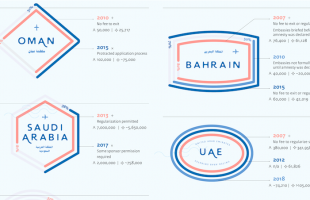This January, the UAE’s Ministry of Labor issued three decrees regulating labor conditions.
The new changes included a standard work contract, conditions of terminating contract, and procedures for work permits. The Ministry said that decrees 764, 765 and 766 will “bring greater transparency, clarity and tighter monitoring of labor contract conditions and ensure both employer and employee enter into fully voluntary relationships.”
The new changes require employers to obtain a standardized offer letter prepared by the ministry’s electronic system. That letter is legally binding and must be signed by both parties. By default, the letter will include an annex that includes aspects of the labor law, rights, and obligations. Both the letter and annex must be signed by both parties before being taken to the ministry for the work permit application.
A similar annex will accompany a standardized work contract, which should be printed from the ministry’s system and signed by both parties. The contracts must specify wages, remuneration, dates of contract, duration, nature of the contract whether limited or unlimited (depending on skill categories), nature of work, and location of employment. Employers will retain the original copies of these contracts.
The processing time for work permits is not specified but is estimated at 4-6 weeks. The process depends on qualifications, documents, medical exams, and employer’s sector and employment quota.
For a visa transfer, workers can change employers after 6 months with employer’s consent. If they are on “limited” contracts, they will face a 6 month ban before starting a new job. Workers in the top three skill categories (professionals with a higher education degree; those with a technical degree; and those with a high school or secondary education degree)will not face such ban. Terminations and resignations must be notified one month ahead.
In other cases, workers can obtain work permit and transfer if employers fail to meet their “legal and contractual obligations” or in case “the employing company has not provided work due to the firm being inactive for more than two months” and if the worker “reports to the ministry during the company shut down.” Permits may also be issued in cases of labor complaints that made it to court.
As for working hours, they are set at 8 hours a day or 48 hours maximum per week. Hours might increase in cases of people working in trade, hotels, cafeterias, security and other jobs determined by the ministry. They might also be reduced in cases of strenuous or harmful work. During Ramadan work shifts must be shortened by two hours in both public and private sectors. One rule is not to have employees work for five consecutive hours without a break. They are entitled to at least 1 hour of a break.
All contracts will be made in both Arabic and English with the option for a third language. The Ministry announced that contracts and employment documentation are now offered in 11 languages: Bengali, Chinese, Dari, Indian, Malay, Nepalese, Sri Lankan, Tamil, and Urdu. Employers will be subject to Dh20,000 fine if a worker is made to sign a contract which they have not read and understood.




